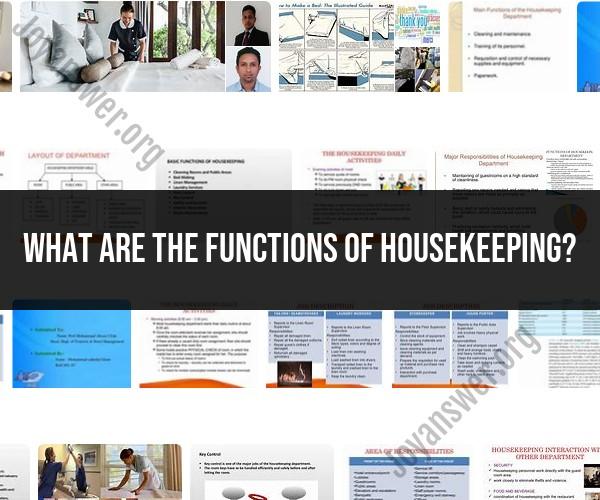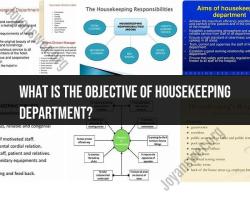What are the functions of housekeeping?
Housekeeping plays a crucial role in maintaining clean, safe, and organized environments in various settings, including homes, hotels, hospitals, offices, and more. The functions of housekeeping encompass a wide range of tasks and responsibilities aimed at ensuring the overall cleanliness, orderliness, and safety of the premises. Here are the key functions of housekeeping:
Cleaning: Cleaning is at the core of housekeeping. This includes dusting, sweeping, mopping, vacuuming, and washing surfaces to remove dirt, dust, stains, and germs.
Sanitizing and Disinfecting: Housekeepers sanitize and disinfect surfaces and high-touch areas to eliminate harmful bacteria, viruses, and pathogens, contributing to a safe and hygienic environment.
Bed Making: In settings like hotels and hospitals, housekeeping staff are responsible for making beds, changing bed linens, and ensuring that guest rooms are comfortable and inviting.
Laundry and Linen Care: This function involves washing, drying, folding, and organizing laundry items, including clothing, towels, and linens, to ensure they are clean and readily available.
Bathroom Maintenance: Housekeepers clean and sanitize bathrooms, including sinks, toilets, showers, bathtubs, mirrors, and fixtures, to provide a clean and hygienic restroom experience.
Trash and Waste Management: They empty trash cans, replace trash bags, and dispose of waste in an environmentally responsible manner, contributing to cleanliness and sanitation.
Kitchen and Food Preparation: In settings with kitchens, housekeeping staff may be responsible for cleaning kitchen areas, including countertops, appliances, and dishes, to maintain a safe food preparation environment.
Floor Care: Housekeepers maintain various types of flooring by sweeping, mopping, waxing, and polishing to ensure safety and aesthetics.
Organizing and Tidying: They organize and tidy up spaces, such as closets, cabinets, and shelves, to reduce clutter and maintain orderliness.
Restocking Supplies: Housekeeping staff ensure that essential supplies, such as toiletries, towels, cleaning products, and amenities, are adequately stocked for the convenience of occupants or guests.
Maintenance Checks: They perform routine inspections and report maintenance issues or damages to the appropriate personnel, ensuring that repairs are promptly addressed.
Pest Control: Housekeepers may take preventive measures against pests, such as using traps or repellents, and report any infestations that need professional attention.
Safety and Security: They contribute to the safety and security of the premises by ensuring that emergency exits are clear, fire extinguishers are in place, and safety hazards are addressed.
Guest Services: In hospitality settings, housekeeping staff may interact with guests, responding to requests for additional services and ensuring a positive guest experience.
Seasonal and Deep Cleaning: They perform seasonal cleaning tasks, such as spring cleaning or preparing for winter, which involve deep cleaning and maintenance of the premises.
Inventory Management: In some settings, housekeepers may be responsible for managing and tracking inventory, including cleaning supplies and linens.
Environmental Sustainability: Housekeeping practices may include efforts to reduce waste, conserve energy and water, and promote eco-friendly cleaning methods to minimize the environmental impact.
Effective housekeeping ensures that living and working spaces are clean, well-maintained, and safe for occupants, contributing to their well-being and comfort. Housekeeping staff play a vital role in creating a positive and hygienic environment in various settings.
The Multifaceted Functions of Housekeeping in Different Settings
Housekeeping is a broad term that encompasses a wide range of tasks and responsibilities. In general, housekeeping is the process of maintaining a clean and organized environment. However, the specific functions of housekeeping can vary depending on the setting.
For example, in a residential setting, housekeeping may involve tasks such as:
- Cleaning and disinfecting surfaces
- Making beds
- Doing the laundry
- Taking out the trash
- Organizing and decluttering
In a commercial setting, such as an office or hotel, housekeeping may involve tasks such as:
- Cleaning and maintaining public areas
- Cleaning and disinfecting restrooms
- Restocking supplies
- Preparing guest rooms
- Managing laundry facilities
In addition to these basic tasks, housekeeping can also involve more specialized tasks, such as:
- Cleaning and maintaining medical equipment
- Cleaning and disinfecting food preparation areas
- Caring for plants and landscaping
- Providing security and safety services
Housekeeping Roles and Responsibilities: Beyond Cleaning
While cleaning is certainly a major part of housekeeping, it is important to note that housekeeping roles and responsibilities extend beyond cleaning to include a variety of other tasks. For example, housekeepers may also be responsible for:
- Maintaining inventory of supplies
- Reporting maintenance issues
- Assisting guests with their needs
- Providing security and safety services
Housekeepers play an important role in ensuring the comfort, health, and safety of occupants in a variety of settings. They are responsible for creating and maintaining clean, organized, and inviting environments.
Housekeeping as a Service: Its Varied Functions in Hospitality
In the hospitality industry, housekeeping is an essential service that plays a vital role in the guest experience. Housekeepers are responsible for cleaning and maintaining guest rooms, public areas, and other facilities. They also play an important role in providing guests with a positive and memorable experience.
Here are some of the varied functions of housekeeping in the hospitality industry:
- Cleaning and maintaining guest rooms: This includes tasks such as making beds, cleaning bathrooms, emptying trash cans, and restocking supplies.
- Cleaning and maintaining public areas: This includes tasks such as sweeping and mopping floors, cleaning restrooms, and dusting furniture.
- Preparing guest rooms for new arrivals: This includes tasks such as inspecting rooms for cleanliness, making beds, and restocking supplies.
- Providing laundry services: This includes tasks such as washing, drying, and ironing linens and towels.
- Assisting guests with their needs: This includes tasks such as delivering amenities, answering questions, and resolving problems.
Housekeeping is a critical service in the hospitality industry. By providing a clean and inviting environment, housekeepers help to create a positive guest experience.
Overall, housekeeping is a multifaceted and essential service that is performed in a variety of settings. Housekeepers play an important role in ensuring the comfort, health, and safety of occupants.










